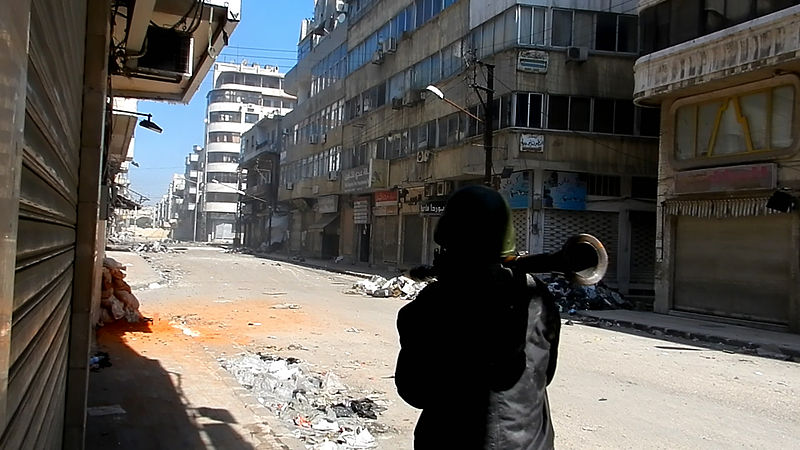Why I Write About Syria
 The tide seems to be irrevocably turning in Syria, the latest Arab country trying desperately to spring. The Free Syrian Army, that sectarian, untrustworthy, and brave coalition of Syrians, has for the first time announced and penned its commitment to human rights last week. The FSA might have brought down a Syrian fighter jet, a first, on Sunday. But things are still going horribly, horribly wrong. Amnesty International released satellite images last week that show more than 600 craters—holes in the ground and people and buildings destroyed from artillery shelling—in the latest hotspot, Aleppo. And latest estimates say that Syrian President Bashir al-Assad has killed over 20,000 people since the uprising and crackdown began.
The tide seems to be irrevocably turning in Syria, the latest Arab country trying desperately to spring. The Free Syrian Army, that sectarian, untrustworthy, and brave coalition of Syrians, has for the first time announced and penned its commitment to human rights last week. The FSA might have brought down a Syrian fighter jet, a first, on Sunday. But things are still going horribly, horribly wrong. Amnesty International released satellite images last week that show more than 600 craters—holes in the ground and people and buildings destroyed from artillery shelling—in the latest hotspot, Aleppo. And latest estimates say that Syrian President Bashir al-Assad has killed over 20,000 people since the uprising and crackdown began.
The resulting math is straightforward. For that number to stop growing, the FSA requires the means to gain ground more quickly—a worthy goal because it has become inevitable that al-Assad will fall. To gain more ground, the FSA requires more advanced and more numerous weaponry. But the United States, which is the great supporter of democracy and which led the intervention in Libya, is refusing to provide these much-needed arms. “So basically you’re just going to let them fight it out on the ground, and hope that the opposition will win; that’s the U.S. stand?” asked an unsatisfied reporter at the State Department last week. And to this question, America’s answer is yes.
This answer and my country’s inaction frustrate me, and it has spurred me, wisely or not, to write on this topic today. I’m not the only one frustrated—smarter and more significant people than I have spoken loudly in the past few weeks. Former State Department official Anne-Marie Slaughter’s recent article titled, “It Will Be a High Price if We Don’t Arm Syria’s Rebels,” and “The Risks of Inaction in Syria” by John McCain, Joe Lieberman and Lindsey Graham are perhaps the loudest calls against the current path the Obama administration is taking.
Acting in Syria—not a Libyan-style intervention, but arming the rebel forces of the FSA—is a strategic and moral no-brainer; even those most wary of U.S. interventionism are calling for America to provide lethal aid, a move that will ultimately save Syrian lives, ensure American strategic interests and cooperation with the next Syrian leadership, and provide necessary consistency for America’s support of freedom and democracy abroad. But America isn’t doing it, and has stressed repeatedly that it isn’t going to.
So why do I write?
This question bothers me, and it should bother us; it should bother everyone reading or writing punditry on the daily devastating news from Syria or from other hellholes around the world. What are we doing if the moral option, the strategic option, the right option, has all but disappeared? Why should we devise new rhetorical ways to condemn practices we don’t like when the alternatives have already been rejected? When the upcoming election or some other ungodly reason that hides under the name of politics stands in the way of the voice of even our country’s senators, what’s the point? Why, then, do I write?
I take comfort here in knowing that there’s something more powerful and philosophically nagging than the next deadline that entices me to condemn people and practices traveling so hopelessly down the wrong road. To articulate what I think and hope this “something” is, I will unworthily turn to George Orwell’s magnificently introspective essay, Why I Write. Writers write out of “the desire to push the world in a certain direction,” Orwell wrote in 1946. While I have such a desire, I recognize how all too impotent I am and my writing will invariably be. Snowball and Napoleon would surely be disappointed. But this desire is no luxury, Orwell tells us. “Looking back through my work, I see that it is invariably where I lacked a political purpose that I wrote lifeless books,” he writes. Impotent or not, Orwell teaches me, it is writing about the hard topics, speaking out on Syria, that automatically breathes life into my words. Political purpose, it turns out, is nothing less than a writer’s very oxygen.
So, why do I write? I write because I have to, because without patriotism, my writing won’t survive. I write so that my voice continues to stand for democracy. I write so that the cause of freedom can appear under my name, as it should under all our names. I write so that my community and my school continue to speak out for those less fortunate than us. I write so that Americanism continues to support human rights and inspire bravery, even if America itself has become too embarrassingly political and uncourageous to actually do so. I write, despite the fact--and because of the fact--that no one’s listening.
